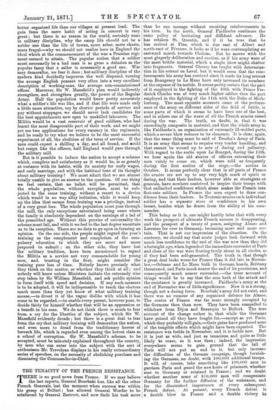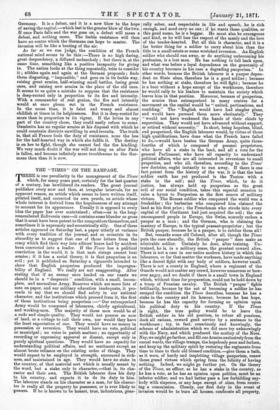THE TENACITY OF THE FRENCH RESISTANCE.
E is no good news from France. If we may believe Trithe last reports, General Bourbaki has, like all the other French Generals, lost the moment when success was within his grasp at Belfort ; has allowed General Werder to be reinforced by General Zastrow, and now finds his task more
than he can manage without receiving reinforcements in his turn. In the north, General Faidherbe continues the same policy of hesitating and diffident advance. He has retaken Bt. Quentin, and if it be true that he has arrived at Fins, which is due east of Albert and north-east of Peronne, it looks as if he were contemplating an eastward march towards Chalons. But he moves with the most gingerly deliberation and caution, as if his army were of the most brittle material, which a single blow might shatter into fragments. General Clumsy has fought with determina- tion in his retreat on Laval, but it would seem that the rein- forcements his army has received since it made its long retreat from Beaugency to Le Mans have only increased its numbers at the expense of its mettle. It seems pretty certain that the part of it employed in the fighting of the 10th with Prince Fre- derick Charles was of very much higher calibre than the part employed in the fighting of the 11th with the Duke of Meck- lenburg. The most opposite accounts come of the perform- ance of the army on different sides of the field of battle, in some parts of which it seems to have been one of the best, and in others one of the worst of all the French armies raised during the war. The truth, no doubt, is, that it was exceedingly composite in material, and that the whole army is, like Faidherbe's, an organization of extremely ill-welded parts, which a severe blow reduces to its elements. It is clear, again, that the same thing must be said of Trochu's Army of Paris. It is an army that seems to require very tender handling, and that cannot be wound up to acts of daring and gallantry. With regard to the sortie upon Le Bourget, during the 13th, we hear again the old stories of officers entreating their men vainly to come on, which were told so frequently during the first sorties of the siege,—the sorties in October. It seems perfectly clear that in all parts of France the armies are not up to any very high mark of spirit or daring, and that their leaders, however able as strategists or generals, have nowhere contrived to inspire their troops with that unlimited confidence which alone makes the French into first-rate soldiers. In France the men expect to draw con- fidence from their leaders. In Teutonic armies each individual soldier has a separate store of confidence in his own breast, besides what he draws from the ability of his com- mander.
This being as it is, one might hastily infer that with every week the prospect of ultimate French success is disappearing, and the prospect of a treaty of peace, assigning Alsace and Lorraine for ever to Germany, becoming more and more cer- tain. That is not our impression of the situation. On the contrary, we should say that acute judges look forward with
much less confidence to the end of the war now than they did a fortnight ago, when legends of the immediate surrender of Paris and close of the war were floating freely about in all circles, as if they had been self-generated. The truth is, that though a great deal looks worse for France than it did late in Novem- ber,—Orleans and Le Mans both in German hands, Brittany threatened, and Paris much nearer the end of its provisions, and consequently much nearer surrender,—the truer account of things would be to say that the area both of the attack and the resistance is greatly increased. Faidherbe's army at the end of November was of little significance. Now it is a strong, though not a daring force. Bourbaki's army did not exist, and there was no rumour of any organized defence for Alsace. The centre of France was far more strongly occupied by the Germans then than now. They have been compelled to withdraw from Dijon and Besancon to Belfort. The true account of the change rather is, that while the Germans have gained all they have fought for,—except as yet Paris, which they probably will gain,—their gains have produced none of the tangible effects which might have been expected. The resistance was feeble in November, and it is feeble now. But it is just as wide, and just as tenacious, and quite as little likely to cease, as it was then ; indeed, the impression everywhere seems to gain ground that the fall of Paris will not put an end to it, but only increase the difficulties of the German campaign, though furnish- ing the Germans, no doubt, with 100,000 additional troops. It will, of course, take something like 100,000 men to garrison Paris and guard the new hosts of prisoners, whether sent to Germany or retained in France ; and we doubt whether another army of 100,000 men will compensate Germany for the further diffusion of the resistance, and for the diminished importance of every subsequent French defeat. At present, every French defeat is a double blow to France and a double victory to
Germany. It is a defeat, and it is a new blow to the hope of saving the capital,—which last is the greater blow of the two. If once Paris falls and the war goes on, a defeat will mean a defeat, and nothing more. The feeble resistance will then have no centre which the Germans can hope to master. The invasion will be like a beating of the air.
As far as we can judge, the condition of the French national mind seems to be this :—There is no high daring, great despondency, a diffused melancholy ; but there is, at the same time, something like a positive incapacity for giving in. The nation looks at the thing repeatedly, tries to consider it ; nibbles again and again at the German proposals ; finds them disgusting, " impossible," and goes on in its feeble way, raising great armies, half-winning small battles, losing great ones, and raising new armies in the place of the old ones. It seems to us quite a mistake to suppose that the resistance is deep-rooted only in proportion to its fire and intensity. With a commander of real genius, the fire and intensity would at once gleam out in the French resistance. In the mean time, it is faint and weary and almost childish at times in its helplessness. But it is deep-rooted far more than in proportion to its vigour. If the levies in any part of the country chose, they could easily refuse to come. Gambetta has no regular armies at his disposal with which he could constrain districts unwilling to send recruits. The truth is, that all France feels the duty of resistance, none the less for the half-hearted way in which she fulfils it. The destiny is on her to fight, though she cannot feel the fire kindling. We very much doubt if the war will not drag on after Paris is fallen, and become infinitely more troublesome to the Ger- mans then than it is now.































 Previous page
Previous page